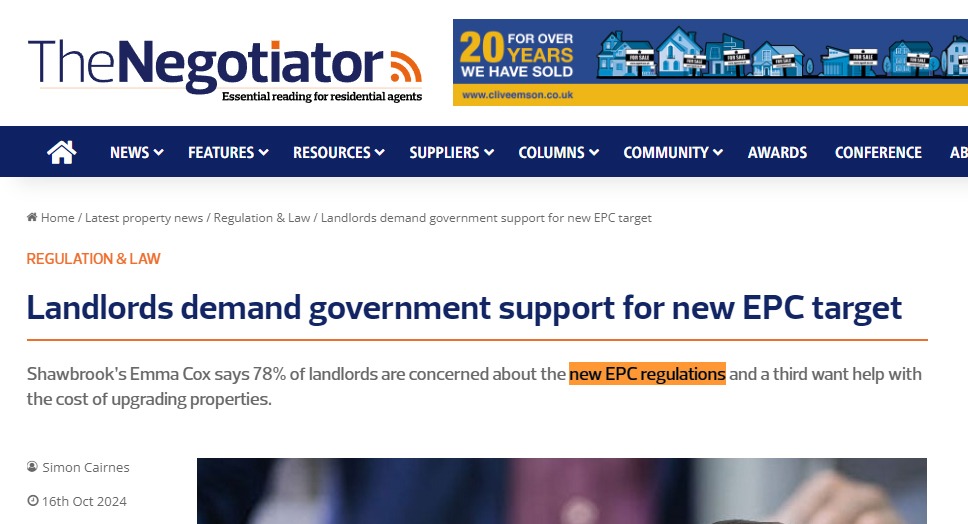
Holy déjà vu!
I have no idea why, but landlord media seems to love overdosing on misinformation when reporting on EPC regulations for the Private Rental Sector.
My attempt in dismembering fact from fiction on this very issue feels like very familiar territory. Oh right, because it is.
Apparently there’s a new EPC regulation. Again! That’s news to me. Again!
Spoiler alert: there isn’t!
I genuinely don’t know if it’s due to rotund, couch-potato journalists commenting on issues they haven’t properly researched, or if we’re intentionally being tortured with click-bait hogwash.
But what’s really starting to crawl up my nose this time round are the endless surveys that are being published, many of which are based on untruths. My news feeds are riddled with them. Apparently we need 20,000 surveys conducted to confirm that landlords are concerned about an obviously concerning issue.
- “New survey reveals that 80% of landlords are facing bankruptcy and moving back in with their parents due to new EPC regulations.”
- “The Royal Academy of EPC’s data reveals that 90% of landlords are considering getting a real job because of new EPC regulations.”
- “New survey by the Institute of EPC shows that 8 out of 10 Landlords are considering selling their Grandmothers dentures to fund eco-friendly improvements to meet new EPC regulations.”
Christ on a bike, stop with the surveys already.
The bar is low. And ridiculous.
So I’m going to go over what I believe to be the current status of EPCs today. No noise, no God forsaken surveys, just the facts.
Landlord EPC regulations have NOT changed – the minimum rating required is still ‘E’
First and foremost, know that nothing changed during the closing stages of the Tory government, and nothing has changed since Labour gained power. Absolutely diddly-squat.
The 2018 ‘Minimum Level of Energy Efficiency’ standard is still in play, meaning that all private rentals in England and Wales must meet a minimum grade of ‘E’, unless they qualify for an exemption.
End of.
“Okay, but what about…”
SHHHHHH, CUPCAKE!! I said end of.
What about the new EPC regulations requiring landlords to ensure their properties meet a minimum ‘C’ rating?
Yeah, it doesn’t exist.
Yup, I’m being serious.
During the shit-show of a Tory administration, a pig’s ear of an idea to set the EPC minimum rating to band C was introduced, with the lofty goal of rolling it out by 2025.
Even back then, I was throwing hissy-fits over the same issue – prominent media outlets were telling us that the proposal was the same as a fully fledged regulation. Neanderthals. Hence the crippling case of déjà vu.
Sadly, the Tories got escorted off the premises before they had a chance to execute any changes to the EPC regulations. Unlucky.
Obviously the current Labour administration was inspired by said pig’s ear. Why wouldn’t they be? So, as it stands, they recently confirmed they have similar ambitions and have consequently proposed that they are determined in changing the minimum EPC rating to C by 2030 (exemptions will still very likely be available for certain properties).
However, once again, it is not regulation. There is no new EPC regulation! Nothing has changed, despite what you may have heard.
Exhibit A:

- Reference stupid meaningless survey
- Reference “new EPC regulations” that doesn’t exist
Brilliant.
Remarkably, I managed to find everything we need to know about the latest and non-fictional EPC regulations on the Gov website in this nifty EPC guide for landlords. Given the state of the commentary, you’d think it’s locked behind a magical portal in a wardrobe, guarded by a talking lion and a witch.
Hey, look at that, it even shuts down what many other publications are trying to convince us is real:
Government has committed to look at a long term trajectory to improve the energy performance standards of privately rented homes in England and Wales, with the aim for as many of them as possible to be upgraded to EPC Band C by 2030, where practical, cost-effective and affordable.
We are exploring policy design options with a view to consultation in due course. We ran a series of regional stakeholder workshops in England and Wales this summer to discuss options.
I know that might come as a shock to some, and now you might be wondering, “how can this be? I’ve been told it’s a done deal! What about all the surveys?”
Darling, I understand, and believe you me, it’s not your fault. This be because we’re victims of dog-turd information being relentlessly forced down our gullets. For reasons unbeknown to me, these sickos are adamant on telling us that a new minimum C rating is regulation when it’s not. They’ve been doing it for years. It’s super weird. And as for all those looney surveys, they’ve done irreparable damage to my mental health, too.
Will Labour eventually enforce a new regulation, requiring a minimum C rating? Probably. But they haven’t. I’ll let you know if they do.
Should Landlords prepare for a minimum C requirement (this part is important)?
While it’s entirely possible for Labour to unleash the Tories pet project into the wild sooner rather than later, I also believe there’s a good possibility the final version will differ from what we know today. That’s why I always think it’s risky making big pivots off the back of ideas alone, and the more sensible approach is to plan.
At the very least, it would probably be wise to consider booking an assessment if your current EPC report is over four years old. The way ratings were calculated was updated back then, so older ratings may differ from post-update ones, for better or worse. This way, you’ll know exactly where you stand today – and how many of your relatives’ kidneys you’ll potentially need to flog to fund a C rating if you currently fall short.
Over the past few months I’ve personally been getting my rentals assessed for that reason. However, it *might* actually be beneficial for you to sit back and wait a little before you start frantically booking your assessments (assuming you can wait without breaching your current Landlord EPC obligations), for reasons I was unaware of at the time of my arranging my assessments…
The way EPC scores are calculated will change in 2025
Plot twist!
The government is on the verge of releasing an update for the Standard Assessment Procedure (SAP), the methodology used to estimate the energy performance of homes.
The current version is RdSAP 2012, and the update they’re working on is RdSAP 10, which is expected to be rolled out in early 2025.
So what does that mean? The way EPCs are calculated will change again, meaning the pre and post update rating for a property might be different.
This post on PropertyTribes forum, by an EPC assessor, stated the following:
The changes are specifically designed to improve the accuracy of EPCs with Assessors less reliant on the use of “default” values.
We believe the more accurate EPCs will translate into higher ratings on properties that have been assessed under the previous EPC software.
Well, that sounds like a lifeline! Maybe there’s hope for those of us that have old newspapers and baking paper stuffed in the wall cavities for insulation *fingers crossed*
However, I personally wouldn’t pin all my hopes and dreams on the prospect of getting a better rating post RdSAP 10 off the back of a forum post by one assessor.
No offence to that chap – I’m sure he’s beautiful in all the right places – and he could be dead right, and that would be incredible. However, I’m getting that familiar itch in my briefs, which is usually a reliable indicator to rein in my excitement and keep a level head. My guess is, we won’t really know what’s what until we have real data to work with. And even then, I’m sure the shiny new algorithm will contain nuance rules that won’t work in everyone’s favour.
I know, I know, waiting for the fat lady to sing is terribly old fashioned. I should jump the gun and be more optimistic.
To be honest, had I known about RdSAP 10 before booking my EPC assessments a couple of months ago, I still would have gone ahead and booked them. Hypothetically, if any of them were rated below C, I would have evaluated how much cheese it would take to meet the grade and then considered whether to wait for RdSAP 10 before booking another assessment. My thought is, burning through multiple assessments could be significantly cheaper than upgrading a D (or lower) rated property to a C.
Of course, there’s always a chance that the new methodology works against me, despite RdSAP 10 allegedly being more forgiving, but that’s a risk I’m willing to take. YOLO!
Now that you know the facts, you can choose the path you want to take and hedge your bets in the way that best suits your situation.
FYI, all my rentals were rated C. Not bragging, just sayin’
EPC assessments today are a lottery pick – so is it worth trying your luck more than once?
This is purely anecdotal, but based on my own experiences and what I’ve heard from other landlords, I believe it to be true.
I’m not sure why or how this happens, or if it will change with RdSAP 10, but there seems to be obvious inconsistencies in how assessors grade properties. So much so that your fate can often depend on which assessor shows up on the day, how hospitable you are, and how much cleavage you’re willing to expose during their visit.

In other words, Assessor A might give your property a grade ‘C’, while Assessor B could rate it a ‘D’. On top of that, Assessor A might offer entirely different advice on how to improve your rating compared to Assessor B. I’ve heard some crazy stories that make absolutely no sense.
I won’t speculate on why there are inconsistencies, but I’m confident it’s a real thing – and I don’t believe it’s a small-scale issue.
My homie, The Secret Landlord, spent a small fortune making eco-friendly upgrades to a property, only to be told that the property is 1 point off a C rating. The assessor suggested – prepare for it – lowering the ceilings by 400mm to earn that extra point.

What in the actual fuck?
Lower the ceilings by 400mm?
Because there’s a short fall of 1 measly point [from being C rated]?
HAHHAHA.
That’s mental! That Sasquatch assessor must be out of his damn mind.
If that’s the case, may as well rebuild the entire house with Bamboo and solar panels, and aim for the mythical ‘A’ rating.
Obviously, now the question begging to be asked is, should we splash out on a second assessment if the first one seems daft and/or unsatisfactory?
All I’ll say is that it’s an option that could, remarkably, work in your favour, even though it absolutely shouldn’t. Let’s hope that, the second time around, someone totally deflated and uninspired by their job – prone to cutting corners and being carelessly generous – shows up at your door.
But again, bear in mind, double-dipping could equally work against you, especially if a Lieutenant Jobsworth turns up for the job.
If I was in The Secret Landlord’s situation, my initial thought would have been to question whether this is actually happening or if I’m having vivid nightmares after eating too many Babybels. If confirmed to be reality, I would without hesitation talk to a different assessor and schedule another assessment. It really wouldn’t be unheard of for someone else to recommend something as simple as changing a lightbulb to move the needle.
Booking EPCs
I booked my EPCs through my affiliate partner energyperformancecertificates.co.uk. It was a pretty seamless process, I must say. I don’t get any special discounts or treatment, I merely practice what I preach.
Their website says prices start from £34, but the cheapest quote I could get is £59. I tried various different postcodes just out of curiosity, but could never get offered that enticing £34 rate.
Still, pretty reasonable, I thought.
Skip EPC Fees – get up to 10 FREE EPCs!
I’d be remiss if I didn’t mention Skipton Building Society’s FREE EPCs offer (I’ve mentioned it a few times already in previous newsletters, so you may already be in the loop).
It was a letting agent on Twitter/X who first brought their offer to my attention, mentioning that many of his landlords have taken full advantage.
Skipton Building Society savings account holders are eligible for up to 10 free EPCs (limited to one per property), which is incredible. Yes, 10 EPCs!
Interestingly, since I became enlightened, quite a few landlords have also directly told me they’ve taken advantage of the offer, saving hundreds on EPC fees.
So if you have a savings account with them (or want to sign up to benefit from the freebie, which could result in big savings for landlords with multiple properties), here is more details on how to bag FREE EPCs (I’m not affiliated with Skipton Building Society whatsoever).
Right, I’m done.
Knowing my luck, Labour will confirm new EPC regulations on the day I publish this, rendering this post an absolute calamity. I might genuinely lose my mind if that happens. Only joking. I already lost it after enduring all the soul-destroying fucking surveys. According to my anal-passage, 74% of landlords agree with me.
Landlord out xo
Disclaimer: I'm just a landlord blogger; I'm 100% not qualified to give legal or financial advice. I'm a doofus. Any information I share is my unqualified opinion, and should never be construed as professional legal or financial advice. You should definitely get advice from a qualified professional for any legal or financial matters. For more information, please read my full disclaimer.


 Landlord Products / Services
Landlord Products / Services




























Great article, thank you. And for your blog generally, a nice dose of reality in a world of bullshit.
Whilst, as you make very clear, it's never been actual law, for someone with an old Victorian E property, it has been a nagging worry for years. And it was all for nothing when Sunak just dropped it before the election!
In my case getting a C would be virtually impossible. I expect I would need to put in internal wall insulation, which is not a minor job, and which could damage the property; leaving it to the last minute when the legislation was certain would've been a very bad idea.
It was never clear to me whether not being able to get a C would make the property unrentable. The new proposals mention a mininum spend of £10,000 for compliance, which wouldn't be that terrible, but I'm not clear on the detail, and still unsure whether exceptions would be allowed for properties that cannot achieve a C.
Anyway, I've very recently gotten out, for other reasons, and I'm very happy it's something I'll never have to worry about again.
At no point did I ever consider getting another one done. Knowing my luck, it would've come up an F!